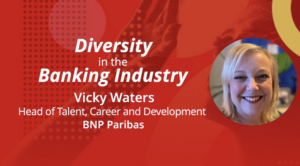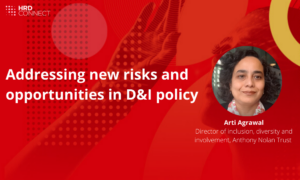Why diversity is a long game for businesses
- 5 Min Read
As businesses look to a future of growth and possibility, all eyes are on HR to drive diversity and increase performance. But to do so effectively and sustainably, leaders must prepare to invest for the long-term to see the benefits.
- Author: David Falzani
- Date published: Oct 15, 2021
- Categories

The notion that diversity can improve an organisation was in no small part pioneered by management theorist Meredith Belbin. His groundbreaking studies of collaboration in the workplace sparked the realisation that the most effective teams tend to be those that combine different kinds of people.
Belbin devised a series of “business games” to analyse management teams in action. Carried out in the 1960s and 1970s, his research laid the foundations for his theory of “team roles”. He later outlined his ideas in a seminal book, Management Teams: Why They Succeed or Fail.
Fast-forward several decades and we find diversity a perennial talking point in all walks of business and in organisations of any size. While gender still dominates most debates, issues such as race, age, disability and less “visible” differences – for example, a person’s background or beliefs – are now routinely considered.
Crucially, a wealth of evidence has underlined diversity’s contribution to corporate performance. One widely cited McKinsey & Company study hailed diversity as a “key differentiator” after finding firms in the top quartile for executive teams’ ethnic/cultural diversity were 33% more likely to have industry-leading profitability.
Yet diversity can also bring difficulties, and it’s essential that businesses understand long-term gain might involve at least a little short-term pain. So let’s explore why diversity is desirable; let’s examine why it isn’t always plain sailing; and let’s reflect on why, in the final reckoning, the pros massively outweigh the cons.
Beyond box-ticking
One of Belbin’s most intriguing insights is the so-called “Apollo Team syndrome”. Taking a cue from NASA’s space programme, a renowned hotbed of brilliance and expertise, Belbin gave the tag of Apollo Team to the group apparently blessed with the brightest and most highly qualified members.
The name was one thing; the reality was quite another. Belbin discovered the Apollo Team, contrary to intuition, regularly lagged behind most of the other teams that participated in his “business games”.
The problem, as Belbin concluded, is that ability alone is of strictly limited use if the people who possess it can’t function together as a unit. Without the necessary skills, structure and “glue”, potential simply doesn’t translate into performance.
To put it another way: an Apollo Team is insufficiently diverse. Seen through the prism of Belbin’s “team roles” concept, it’s full of “specialists” – single-minded, dedicated individuals able to provide in-depth knowledge – but woefully devoid of “coordinators”, “teamworkers”, “shapers” and all the other elements needed for genuine success.
And that’s really what diversity means in a business context. It isn’t about ticking boxes – even though this is how many organisations continue to treat it. It’s about promoting what’s increasingly defined as diversity of thought.
Tension is inevitable
Of course, determinedly assembling a team whose members think differently from each other is bound to cause a few complications. We can easily illustrate this with reference to what I call the apocryphal agitator experiment.
Let’s say we’ve built a team – one capable of attaining a reasonable level of performance but seemingly unable to go any further. Aware a plateau appears to have been reached, we add to the ranks a new member whose role is to question, argue, play devil’s advocate and generally shake things up.
Research suggests this should enhance the team’s performance. By offering a fresh perspective that subjects the decision-making process to greater rigour and analysis, the agitator inspires everyone to do things not only better but differently.
Yet research also suggests the agitator is the most likely person to be cast out if a team is invited to vote for a member’s removal. And this tells us it can be hard to acknowledge a colleague as an engine of success when they’re more broadly regarded as a contrarian pain in the backside.
In my experience, boards of directors can be especially indisposed to novel outlooks. Top-tier managers often prefer a quieter life in which everyone holds the same opinion. But we should be careful not to mistake acquiescence for certainty.
Being right is what really matters
Linus Pauling, who won two Nobel Prizes, famously observed: “If you want to have good ideas then you must have many ideas. Most of them will be wrong, and what you have to learn is which ones to throw away.”
This is what we’re aiming for when we encourage diversity. We want to enjoy the advantages of multiple views, fruitful disagreement, constructive criticism and meaningful scrutiny.
Ultimately, when all the wrong ideas have been dissected and dismissed, what really counts is that we – not this or that individual – are right. It’s a matter of ensuring a business and its stakeholders benefit from well-informed decisions.
The lesson: the value brought by people with whom we might not unswervingly concur usually dwarfs the irritation they may occasionally provoke in us. I ought to know, because I’ve met my fair share of such characters – and there are no doubt plenty of folks who feel much the same about me.
Yes, we all have a natural inclination to favour those who think as we do. Relatedly, too much stress is manifestly undesirable. But diversity reminds us there’s a correlation between positive tension and team performance – at least up to a point – and proves healthy conflict is just part and parcel of doing things well.
David Falzani MBE is a Professor at Nottingham University Business School’s Haydn Green Institute for Innovation and Entrepreneurship (HGIIE) and president of the Sainsbury Management Fellowship.









